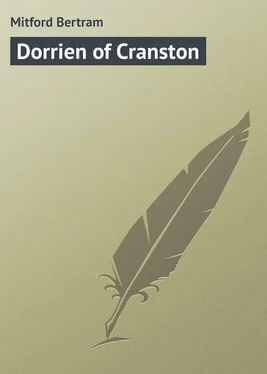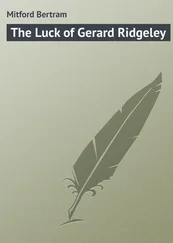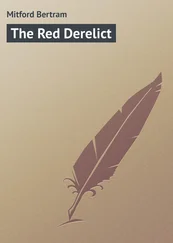Bertram Mitford - Dorrien of Cranston
Здесь есть возможность читать онлайн «Bertram Mitford - Dorrien of Cranston» — ознакомительный отрывок электронной книги совершенно бесплатно, а после прочтения отрывка купить полную версию. В некоторых случаях можно слушать аудио, скачать через торрент в формате fb2 и присутствует краткое содержание. Жанр: foreign_prose, на английском языке. Описание произведения, (предисловие) а так же отзывы посетителей доступны на портале библиотеки ЛибКат.
- Название:Dorrien of Cranston
- Автор:
- Жанр:
- Год:неизвестен
- ISBN:нет данных
- Рейтинг книги:4 / 5. Голосов: 1
-
Избранное:Добавить в избранное
- Отзывы:
-
Ваша оценка:
- 80
- 1
- 2
- 3
- 4
- 5
Dorrien of Cranston: краткое содержание, описание и аннотация
Предлагаем к чтению аннотацию, описание, краткое содержание или предисловие (зависит от того, что написал сам автор книги «Dorrien of Cranston»). Если вы не нашли необходимую информацию о книге — напишите в комментариях, мы постараемся отыскать её.
Dorrien of Cranston — читать онлайн ознакомительный отрывок
Ниже представлен текст книги, разбитый по страницам. Система сохранения места последней прочитанной страницы, позволяет с удобством читать онлайн бесплатно книгу «Dorrien of Cranston», без необходимости каждый раз заново искать на чём Вы остановились. Поставьте закладку, и сможете в любой момент перейти на страницу, на которой закончили чтение.
Интервал:
Закладка:
One of his first acts had been to make a call at Wandsborough Rectory to explain the circumstances of the assumed name. At first his explanation had been somewhat stiffly received, but it was not in Dr Ingelow to keep up resentment; moreover, a happy remark to the effect that the incognito had been the means of beginning what the speaker hoped he might be allowed to call a valued friendship, which otherwise he might never have known, completed the turning of the scale, and he was absolved all round. Yet not quite all round, for Olive, remembering her free and easy utterances made on the beach that morning, found an early opportunity of taking him privately to task.
“I think you might have told me at the time,” she had said, “instead of letting me run on with all sorts of local gossip as you did.”
“Why? Oh, I see. But you didn’t abuse us a bit more than we deserve. I asked you a question and you answered it. And, between ourselves, the answer didn’t surprise me in the very least.”
“That’s all very well, but you ought to have stopped me.”
“How hard-hearted you are, when all the others have forgiven me!”
“Have they? Oh, well, then, for the credit of the family I suppose I must exercise the same Christian virtue,” had said Olive mischievously. “You may consider yourself forgiven by me too. There.”
“One thing more,” he had urged, “is wanted to make that forgiveness complete. You must continue to mete me out the same treatment as you did to the stranger, Rowlands; not categorise me as an obnoxious Dorrien.”
“That will depend entirely upon your future behaviour,” she had returned, with the same mischievous flash.
The lake was barely five minutes’ walk from the house, and as the two – the three, rather, for Roy, all the fresher for his ducking, was trotting along at their side – turned the corner of the garden walk, they came face to face with their mother and two young ladies, who were speedily introduced as the Miss Nevilles.
“We’ve been in the coolest corner of the county all the morning – on the water,” said Roland, catching his mother’s displeased glance at his sister. “Nellie wanted to go indoors half an hour ago, but I positively refused to let her land.”
“What a beautiful dog! Is it yours, Mr Dorrien?” said the eldest.
“Yes. Come here, Roy, and exhibit yourself.” Roy obeyed, but manifested no great effusion in response to the young lady’s somewhat timid caresses. His master decided that Clara Neville was at the moment thinking more of the fit of her gloves and the pose of her head, than of the dog or anything else. She was a tall, slight girl, faultlessly dressed, and in good style altogether; but in spite of the regular profile and wavy profusion of her golden hair, the face was not altogether a taking one – an unfriendly critic would have pronounced it a somewhat cold and ill-tempered one. But then she was the heiress of Ardleigh Court – whose place in the county ranked little below that of Cranston, and this would cover far graver shortcomings. Her sister, Maud, was a quiet, dark-haired little thing, with no pretensions to looks. Yet there were many who thought that a future lord might be found for Ardleigh Court much sooner were she the heiress.
Their father, a jolly, bluff veteran with an ever-ready laugh, was as complete a representative of one type of old soldier as his friend and erstwhile companion in arms, Reginald Dorrien, was of another. The Colonel was the kindest-hearted of men. Cheery, frank and full of life and humour, he was an immense favourite with the rising generation, and indeed with everybody. Everybody except his wife and eldest daughter, by whom – such is the irony of events – the old man’s jovial and kind-hearted character went entirely unappreciated. They chose to consider it lamentably lacking in dignity.
“Dorrien,” cried Colonel Neville to his host as they sat at luncheon, “is it true that your fellows have dropped down on that rascal Devine again?”
“Yes. Caught him in the act. Two hares, or three – I forget which. He was taking them out of the hangs when they dropped upon him.”
“Ah! We must make it lively for him at the Sessions the day after to-morrow. The law ought to empower us to send a regular poacher to serve in the army. Why, when we were up country on active service some of our best men were ex-poachers. Why, Dorrien, you yourself remember poor Wilkins that time we – ”
But the jolly Colonel’s reminiscence was cut short by his eldest daughter, who appealed to him to settle a divergence of opinion between herself and Nellie. This was a regular tactic of Clara’s. Her father was never to be suffered to launch out in reminiscence. Old men, she declared, old soldiers especially, with a mania for reminiscence were always bores. So the exploit of “poor Wilkins, ex-poacher,” was destined to remain unnarrated.
Of all the more or less inane phases of entertainment devised by society with a view to doing its duty by its acquaintance, the garden party is not far from being the most tiresome. The Cranston one bore a striking family likeness to others of its kind.
Roland, who hated the whole thing, and wished all the people at the deuce, and through whose head was buzzing a confused string of names – belonging to people to whom he had been introduced – found himself, before he was aware of it, in a vacant seat next to Clara Neville, and almost felt grateful to her for being there. She would do to talk to, as well as anyone else, and he would be spared the trouble of opening up fresh ground. So an involuntary sigh of relief escaped him, which that young lady, for all her imperturbable calm, made a careful note of.
“Don’t you play croquet, Mr Dorrien?” she said.
“I don’t. Nothing on earth would induce me to embark in the very feeblest attempt at amusement ever devised by a stark idiot for the scourge of civilised man.”
She laughed. “Do you know, between ourselves, I quite share your opinion. The game is, as you say, terrible boredom. But you have been a great traveller, have you not?”
“No. Nothing out of the way. I’ve knocked about a good deal, but only where everyone else has.”
“Ah, you must have seen some strange things. And I think every man who can should travel. Not in the beaten tracks – on the Continent – but in far wild countries where he is entirely dependent on himself. It must open up the mind a great deal, and do a world of good.”
“Yes, it has a very salutary and hardening effect; there’s no doubt about that.”
“I suppose now you are home again, you will settle down for good,” she went on. “And this is really a very beautiful spot, is it not? But you travellers are never happy for long in one place?” she added, turning to him with a very engaging smile, the more valuable on account of its rarity.
“Likely enough it’ll be my bounden duty to become moss-grown now,” he answered with a laugh.
“No, don’t move, Roland,” said his father, as he rose to give up his seat. “I’m not going to sit down,” and there was a cordiality in his tone, as well as in the light touch of his hand upon his son’s shoulder, which caused that worthy to marvel greatly. But Roland was glad to be left in peace, so he sat chatting with Clara Neville, heedless of the notes of invitation thrown out to him from many pairs of bright eyes, till at last, feeling bored, he seized upon some pretext to slip away and have a stroll round the shrubbery with Roy.
But the first person he encountered on turning into it was Colonel Neville, who started guiltily, and then burst into a hearty laugh.
“Aha!” he cried, “another defaulter! Come along, my boy, and we’ll have our smoke together,” and he puffed away at his half-smoked cigar. “We must bind ourselves not to betray each other, unless we are caught red-handed, as I thought I was just now, by Jove!” And the jolly Colonel gave vent to another of his ringing laughs, to the jeopardy of bringing about the very discovery he wished to avoid.
Читать дальшеИнтервал:
Закладка:
Похожие книги на «Dorrien of Cranston»
Представляем Вашему вниманию похожие книги на «Dorrien of Cranston» списком для выбора. Мы отобрали схожую по названию и смыслу литературу в надежде предоставить читателям больше вариантов отыскать новые, интересные, ещё непрочитанные произведения.
Обсуждение, отзывы о книге «Dorrien of Cranston» и просто собственные мнения читателей. Оставьте ваши комментарии, напишите, что Вы думаете о произведении, его смысле или главных героях. Укажите что конкретно понравилось, а что нет, и почему Вы так считаете.












